PIERCE &CUDDIE
Cuddie, for shame hold up thy heavye head,
And let us cast with what delight to chace,
And weary thys long lingring Phoebus race.
Whilome thou wont the shepheards laddes to leade,
In rymes, in ridles, and in bydding base:
Now they in thee, and thou in sleepe art dead.
CUDDY
Piers, I have pyped erst so long with payne,
That all mine Oten reedes bene rent and wore:
And my poore Muse hath spent her spared store,
Yet little good hath got, and much lesse gayne,
Such pleasaunce makes the Grashopper so poore,
And ligge so layd, when winter doth her straine.
The dapper ditties, that I wont devise,
To feede youthes fancie, and the flocking fry,
Delighten much: what I the bett for thy?
They han the pleasure, I a sclender prise.
I beate the bush, the byrds to them doe flye:
What good thereof to Cuddie can arise?
PIERS
Cuddie, the prayse is better, then the price,
The glory eke much greater then the gayne:
O what an honor is it, to restraine
The lust of lawlesse youth with good advice:
Or pricke them forth with pleasaunce of thy vaine,
Whereto thou list their trayned willes entice.
Soone as thou gynst to sette thy notes in frame,
O how the rurall routes to thee doe cleave:
Seemeth thou dost their soule of sence bereave,
All as the shepheard, that did fetch his dame
From Plutoes balefull bowre withouten leave:
His musicks might the hellish hound did tame.
CUDDIE
So praysen babes the Peacoks spotted traine,
And wondren at bright Argus blazing eye:
But who rewards him ere the more for thy?
Or feedes him once the fuller by a graine?
Sike prayse is smoke, that sheddeth in the skye,
Sike words bene wynd, and wasten soone in vayne.
PIERS
Abandon then the base and viler clowne,
Lyft up thy selfe out of the lowly dust:
And sing of bloody Mars, of wars, of giusts.
Turne thee to those, that weld the awful crowne,
To doubted Knights, whose woundlesse armour rusts,
And helmes unbruzed wexen dayly browne.
There may thy Muse display her fluttryng wing,
And stretch her selfe at large from East to West:
Whither thou list in fayre Elisa rest,
Or if thee please in bigger notes to sing,
Advaunce the worthy whome shee loveth best,
That first the white beare to the stake did bring.
And when the stubborne stroke of stronger stounds,
Has somewhat slackt the tenor of thy string:
Of love and lustihed tho mayst thou sing,
And carrol lowde, and leade the Myllers rownde,
All were Elisa one of thilke same ring.
So mought our Cuddies name to heaven sownde.
CUDDYE
Indeed the Romish Tityrus, I heare,
Through his Mecoenas left his Oaten reede,
Whereon he earst had taught his flocks to feede,
And laboured lands to yield the timely eare,
And eft did sing of warres and deadly drede,
So as the Heavens did quake his verse to here.
But ah Mecoenas is yclad in claye,
And great Augustus long ygoe is dead:
And all the worthies liggen wrapt in leade,
That matter made for Poets on to play:
For ever, who in derring doe were dreade,
The loftie verse of hem was loved aye.
But after vertue gan for age to stoupe,
And mighty manhode brought a bedde of ease:
The vaunting Poets found nought worth a pease,
To put in preace emong the learned troupe.
Tho gan the streames of flowing wittes to cease,
And sonnebright honour pend in shamefull coupe.
And if that any buddes of Poesie,
Yet of the old stocke gan to shoote agayne:
Or it mens follies mote be forst to fayne,
And rolle with rest in rymes of rybaudrye:
Or as it sprong, it wither must agayne:
Tom Piper makes us better melodie.
PIERS
O pierlesse Poesye, where is then thy place?
If nor in Princes pallace thou doe sitt:
(And yet is Princes pallace the most fitt)
Ne brest of baser birth doth thee embrace.
Then make thee winges of thine aspyring wit,
And, whence thou camst, flye backe to heaven apace.
CUDDIE
Ah Percy it is all to weake and wanne,
So high to sore, and make so large a flight:
Her peeced pyneons bene not so in plight,
For Colin fittes such famous flight to scanne:
He, were he not with love so ill bedight,
Would mount as high, and sing as soote as Swanne.
PIERS
Ah fon, for love does teach him climbe so hie,
And lyftes him up out of the loathsome myre:
Such immortall mirrhor, as he doth admire,
Would rayse ones mynd above the starry skie.
And cause a caytive corage to aspire,
For lofty love doth loath a lowly eye.
CUDDIE
All otherwise the state of Poet stands,
For lordly love is such a Tyranne fell:
That where he rules, all power he doth expell.
The vaunted verse a vacant head demaundes,
Ne wont with crabbed care the Muses dwell.
Unwisely weaves, that takes two webbes in hand.
Who ever casts to compasse weightye prise,
And thinks to throwe out thondring words of threate:
Let powre in lavish cups and thriftie bitts of meate,
For Bacchus fruite is frend to Phoebus wise.
And when with Wine the braine begins to sweate,
The nombers flowe as fast as spring doth ryse.
Thou kenst not Percie howe the ryme should rage.
O if my temples were distaind with wine,
And girt in girlonds of wild Yvie twine,
How I could reare the Muse on stately stage,
And teache her tread aloft in buskin fine,
With queint Bellona in her equipage.
But ah my corage cooles ere it be warme,
For thy, content us in thys humble shade:
Where no such troublous tydes han us assayde,
Here we our slender pipes may safely charme.
PIERS
And when my Gates shall han their bellies layd:
Cuddie shall have a Kidde to store his farme.
CUDDIES EMBLEME
Agitante calescimus illo




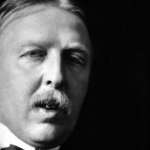

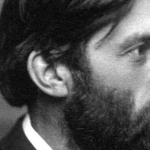




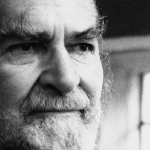


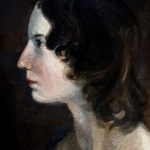
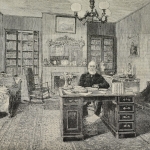

Comment form: